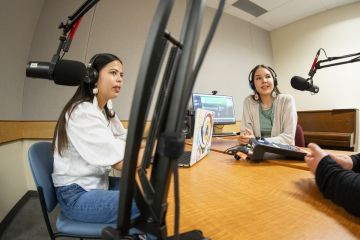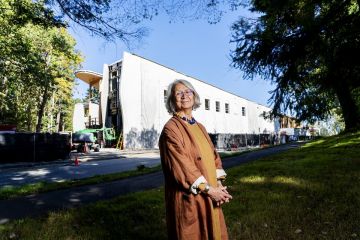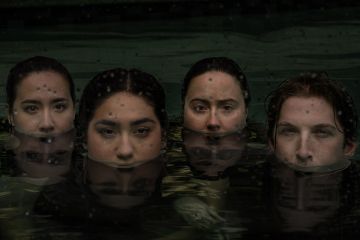Faculty of Education appoints an Indigenous Resurgence Coordinator
- Suzanne Ahearne
Chaw-win-is is the recently appointed Indigenous Resurgence Coordinator (IRC) within the Faculty of Education.
“This position and others initiatives like it across Canada,” says Chaw-win-is, “are a result of the on-going efforts of Indigenous peoples and non-Indigenous allies all across Canada who have been generating awareness about colonization within the education system. The Truth and Reconciliation Commission has highlighted the issue of residential school era as of late and this current government has stated that universities need to take up those Calls to Action, particularly those pertaining to education,” says Chaw-win-is who is Nuu-chah-nulthaht from the Cheklesaht and Tla-o-qui-aht nations.
“Universities are being tasked with creating more a welcoming environment for Indigenous students, faculty and staff, while developing courses that increase awareness about colonization and its impacts on Indigenous peoples,” says the sessional instructor in Indigenous Education. “Acknowledging the unceded territories—the W̱SÁNEĆ homelands—on which this university sits, is a good place to begin. We need to go further by acknowledging the roots of colonization in terms of theft of land, resources, and through control and marginalization of Indigenous peoples through Canadian laws, policies and systems of violence and oppression that’s on-going today.”
Chaw-win-is received her MA in Indigenous Governance at UVic in 2007 and went on to complete two years in the English department in the Literatures of the West Coast Program. She has been involved in Indigenous Education in various roles, including teaching, community coordinating, intercultural education and Indigenous Language Revitalization for over several years.
UVic’s commitment to Indigenous Language Revitalization
“UVic,” says Dean of Education Ralf St. Clair, “is well known for its Indigenous Language Revitalization Programs, and the generally respectful way we’ve engaged with local communities.”
The faculty as a whole has a strong commitment to this area of work, but he notes that it wanted to go further in terms of incorporating Indigenous knowledge and worldviews into its programs.
“The issue,” he says, “was that for many people who are not Indigenous, it’s challenging to know how best to go about moving beyond the ‘one course on Indigenous history’ approach towards a more foundational approach.”
Chaw-win-is’ role as IRC is to act as a consultant and support for teaching staff as the faculty reviews its curriculum and moves it further towards a blending of Indigenous and Western perspectives. From her home base in Indigenous Education, she’ll work closely with faculty and staff and will consult Elders, community partners and the Indigenous Education Advisory Board to develop a variety of Indigenous resurgence initiatives across the Faculty of Education.
“As a teacher, I witness many young people, including my students, who feel dismayed and angry about not having been taught about colonization. After taking courses in Indigenous education, they become open to learning about Indigenous people without swooping us all into one homogenous group. I’ve also seen them become more committed,” she says, “to addressing these wrongs within their families and in their communities.”
Resurgence vs. Indigenization
“Part of what drew me to apply for this position,” Chaw-win-is says, “was the title of resurgence rather than Indigenization. I love the word resurgence. It’s not about something that’s gone. It’s not about undoing and redoing. It’s coming from what we know already and putting that into practice. It’s about remaining Indigenous while interacting with this Western institution.”
Chaw-win-is will also be leading lunch hour workshops and inviting leaders to speak to faculty and staff. One of her initiatives was this September’s Orange Shirt Day—a day to commemorate the intergenerational survivors of the residential school era—by hosting a screening of The Pass System. Another part of her half-time position is to work with the curriculum library to build its Indigenous resources and books by Indigenous authors. She will also be creating an on-line toolkit that can be accessed by staff and sessionals who may not be able to attend lunch time workshops.
When Chaw-win-is started her position this summer, she started a consultation process in which she asked about “hopes, dreams and goals of Indigenous resurgence” in the faculty. She’s working toward creating a dynamic and adaptable Indigenous Resurgence framework by next summer that the faculty can lean on to help guide them in their work.
“The essence of this work is to take these Calls to Action [from the Truth and Reconciliation Commission] and implement them. The framework is a step in that process,” she says. “My broader goal in this work is generating awareness is to ensure that young people have room to imagine a world that they want to be in.”
She tells education students: “You need to be aware that it’s incumbent on you as a teacher to continue to learn, and to pass on, your knowledge of colonization, past and present, because it’s been purposefully silenced for so long.”
Chaw-win-is has also worked on the issue of sexualized violence since 2006 where she and 15 Nuu-chah-nulth women and men organized a march to address the issue of internalized sexualized violence in Nuu-chah-nulth communities.
“One of the outfalls and impacts of residential schools was our removal from our territories,” she says. One of the impacts is internalized sexualized violence connected to the residential school system and restricted our mobility on this land,”she adds. She cites the statistic that Indigenous women are four times more likely than non-Indigenous women to experience violence by the time they’re 40.
Her Cheklesaht name means “boulder on the beach woman.” In her coastal community, she explains, boulders were markers of boundaries. She was given her name by her late grandfather Chah-chin-sun-up (Barney Williams Sr.) in acknowledgement of her work around sexualized violence. Like ancestors before her, she says: “Every time my name is uttered, it reminds me of my responsibility to family and community.”
Strength & Resilience
Of Indigenous youth, she says they’re tired of only hearing staggering stats about suicide rates, abuse and rates of graduation. “They want to see examples of strength and resilience and see themselves reflected in their curriculum. They also want to see more Indigenous teachers and resources folks closely connected to their schools. They want to hear that they’re going to succeed, that they’re supported. They want to know when they go to public school they’ll have access to information about who they are and they want it taught authentically.”
Two of the motivators for her work are her nine-year-old son and her 21-year-old daughter. As the new curriculum is rolling out in BC schools, requiring all courses to be indigenized, she knows how important it is for kids to see themselves reflected in the school, not as an addition, but as a key and core part of learning, and where Indigenous youth are free to be themselves. Chaw-win-is was impacted by the realization that her son is still part of a school system where his language is not taught or recognized.
“The education system and Hollywood have created a story about Indigenous people that we’re all the same. But we’re diverse,” Chaw-win-is says. “In BC alone, there are 34 different languages, which entails 60 per cent of Indigenous languages in Canada. Languages are encapsulate our worldview and practices that are specific to the land from which we originate.”
“We could all learn a lot and live in a more respectful way in these lands,” Chaw-win-is says. “Local coastal peoples, such as the SENĆOŦEN and Lekwungen peoples have lived since time immemorial on this island and despite colonization continue to resist these impacts by revitalizing their languages, practicing our ways on our terms and by centering young people and this land when thinking about the right way to move forward.” As one of her mentor’s, late Philip Paul of W̱SÁNEĆ said, “The land is the culture; without it, we cannot be free as a people.”
In this story
Keywords: Indigenous, education, community, teaching
People: Chaw-win-is




